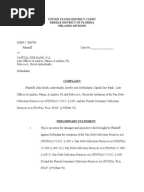Fdcpa Cheat Sheet 1692
The Fair Credit Reporting Act provides protection against the misuse and misreporting of your credit information. When creditors, collectors, or credit reporting agencies violate the provisions of the FCRA, it can cause a lower credit score, denial of credit, higher interest rates on loans and credit extensions, and more. It's important to recognize when the FCRA has been violated, so you can take action and prevent harm to your credit. This article describes some of the more common FCRA violations. What Is the Fair Credit Reporting Act?The FCRA governs the behavior of consumer reporting agencies (also called credit bureaus) and the businesses or individuals that report information to the consumer reporting agencies (CRAs). The CRAs compile this information into your credit report. Your credit report serves an important purpose.
Fair Debt Collection Practices Act As amended by Public Law 111-203, title X, 124 Stat. 2092 (2010) As a public service, the staff of the Federal Trade Commission (FTC) has prepared the following complete text of the Fair Debt Collection Practices Act §§ 1692-1692p.
It can determine whether you can obtain a mortgage, car loan, job, and even an apartment. The FCRA tells CRAs, creditors, and other authorized persons what they can and cannot do with your credit information.To learn more about the FCRA, visit our topic area. Common Violations of the FCRAHere are some of the more common ways that creditors, collectors, and CRAs violation the FCRA. Furnishing and Reporting Old InformationCRAs and the creditors who supply information to them must provide and keep your credit information current. When your credit circumstances have changed and the information in your credit report is not updated to reflect these changes, this may be a violation of the FCRA. Some examples of this include:.failing to report that a debt was discharged in bankruptcy (see ).reporting old debts as new or re-aged (to learn more, see ).reporting an account as active when it was voluntarily closed by a consumer, and.reporting information that is more than seven years old (bankruptcy) or ten years old (civil judgments).Furnishing and Reporting Inaccurate InformationYour creditor must not supply information to a CRA that it knows (or should know) is inaccurate. That includes:.reporting a debt as charged off when you settled it or paid it in full.misstating the balance due.reporting late payments when you paid timely.listing you as a debtor on an account when you were only the authorized user, or.supplying credit information on an account where identity theft was previously reported (or failing to maintain a reasonable procedure for you to report identity theft).Mixed FilesCRAs can also run afoul of their obligations to report accurate credit information about you.
In many instances, this happens when a credit bureau mixes your file with that belonging to someone else with similar background information. Some common cases of mixed files include:.morphing or duplicating negative credit information with a stranger who shares a similar social security number.failing to distinguish the Jr. In similar surnames.mixing the information of persons with the same last name and similar first names, and.combining or mixing credit files of persons with similar names living in the same city or zip code.Failing to Follow Debt Dispute ProceduresWhen you submit a written dispute about the accuracy of an item on your report, credit bureaus and your creditors must take certain actions in response. Their duties include conducting a reasonable investigation of your dispute, correcting any inaccurate information, or even removing the disputed debt from your credit report. There are a number of ways they can fall short of their duties, depending on whether they are the CRA or the creditor. Debt Dispute Violations by CRAsSome common violations by a CRA include failing to:.notify a creditor that you dispute the debt that it has reported.conduct a reasonable investigation of your dispute, or.correct or delete any inaccurate, incomplete or unverifiable information within 30 days of the receiving notice of your dispute.To learn more, see. Self-help services may not be permitted in all states.

The information provided on this site is not legal advice, does not constitute a lawyer referral service, and no attorney-client or confidential relationship is or will be formed by use of the site. The attorney listings on this site are paid attorney advertising. In some states, the information on this website may be considered a lawyer referral service.
Fantasy Football Cheat Sheet
Please reference the Terms of Use and the Supplemental Terms for specific information related to your state. Your use of this website constitutes acceptance of the,.

Don’t let debt collectors take you for a ride Source: 20th Century FoxYou moved out, but your roommate didn’t. Now debt collectors are calling, saying you owe them a few months of rent and fees. What do you do? What can you do?The answer depends largely on what state you’re in and whether your name is on the lease. Can a debt collector come knocking?“A debt collector ‘can’ come after you for just about anything,” Alex Stern, an attorney with the Little Guy Law Firm, P.L.L.C. In Miami Beach, Florida, said in an email. “The question is will they be successful. If your name is in a lease agreement and rent is owed, you may still be liable for unpaid rent even if you paid your share.”Now, if your name is not on the lease, the landlord or collection agency could have a tougher time getting you to pay back-rent.
Still, “if the landlord can provide some evidence that you acknowledge responsibility for the rent, then you may be liable (e.g. A check from you every month for a certain period of time),” Stern said.
